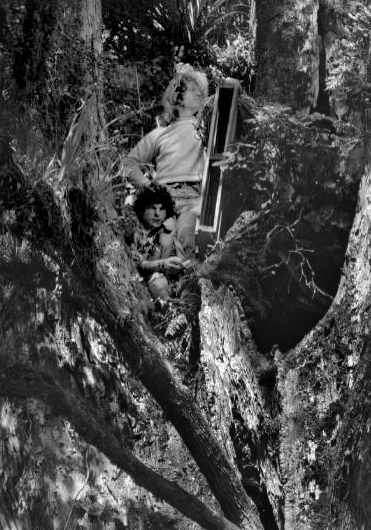|
NEW
ZEALAND
PROTEST * SONG |
Pureora |
|---|
Maori Songs - Kiwi Songs - Home
A
protest against the clear-felling of Pureora State Forest, near Te
Kuiti.
I'm
swinging out on a rata vine In
1840 around two thirds of New Zealand was still
covered in virgin forest. Then between 1840 and
1980, the largest trees in the forests were
felled for timber, or the forest was burnt off
for sheep-farming. In
1946 Pureora Forest was one of the last native
forests to be opened up for logging. One
of New Zealand's most significant conservation
battles took place there in 1978. Protestors
occupied platforms built in the treetops and
their actions led to a government-imposed
logging moratorium. Eventually this brought
about the end of native forest logging
throughout all of New Zealand.
He began writing songs and stories to fit with the
urban experience of Maori of his generation and
turned his frustration with the quality of
educational resources for Maori into action by
becoming editor of Maori School Publications.
In a class of his own, he led the resurgence of
traditional Maori music, and over the years he has
composed many Maori songs, including the popular
Tihore Mai Te Rangi, and he has produced more than
20 recordings.
The music critic Elizabeth Ellis says his simple
but beguiling melodies, combined with his poetic
lyrics in te reo Maori, have appealed to a wide
range of people, including children.
He served as a member of the board of the New
Zealand Film Commission and the New Zealand Music
Commission and as an assessor for Te Waka Toi and
the Arts Board of Creative New Zealand over many
years. He also composed music for various
festivals, productions and orchestras.
In 2002, he was teaching in the School of Maori
and Pacific Development at Waikato University, and
working for his doctoral thesis on the history and
development of Maori Music entitled From when
the gods sang, to the present.
In the 2003 New Year Honours, Dr Melbourne was
made an Officer of the New Zealand Order of Merit
for services to Maori language, music and culture.
He died not long after, at his family home in
Hamilton, on Jan 6 2003, after a long battle with
cancer. The range and depth of Hirini's knowledge
and activities in Maori language, music,
literature and historical research was formidable:
he made an enormous contribution to New Zealand's
cultural landscape.
In June 2003, a posthumous CD, with accompanying
DVD of discussions and performances, recorded in
the final weeks of his life, increased that
contribution. The album, Te Hekenga-a-rangi,uses
traditional instruments incorporating subtle
layering of the sounds in the studio and invoking
atua wahine (female deities).
More details Te
Hekenga-a-rangi Published
NZ Folksong website on 15 Jan, 2010
Tārere
ana au, i te aka o te rata;
I te waonui o Pureora, Aue!
Tārere e he pungawerewere;
Piri i te pito o te tukutuku;
Poipoia nei e te hau.
Puhipuhi e pātuki ohorere taku manawa
Pātuki pakakē aku taringa;
I te wēwē wēwē o te kani mīhini;
Pua auahi poro rākau
Rere ana te kongakonga;
Rere ana te maramara;
Wawā wawā wawā te wao o Pureora.
I te wēwē wēwē wēwē o te kani mīhini;
Pua auahi poro rākau
Oma kau ana ki te tauhuna i ahau
Pātuki ohorere taku manawa;
I te porotanga o te waonui ō Pureora.
Aue, taukiri e! Aue, taukiri e!
Kua mutu.
in the great Pureora forest, Yaaaay!
swinging like a spider
attached by an umbilical cord from its web
billowing about in the breeze.
Then a loud noise
starts my heart pounding
for suddenly assaulting my ears
is the whining of a chainsaw
clouds of tree-cutting smoke
sawdust flying
woodchips flailing
scattering bits of
Pureora forest everywhere.
The whining of that
chainsaw
and clouds of tree-cutting smoke
makes me run away
to hide myself,
my heart suddenly pounding
at the felling of the great Pureora forest.
Alas, so sad! Alas, so sad!
It is all coming
to an end.
Pureora Forest




Pureora
on record
1998, Hirini Melbourne, Te Kururoa CD
Dr.
Hirini Melbourne
Tühoe, Kahungunu.
Composer, university lecturer.
 His
discovery of traditional Maori musical instruments
led him on a journey of discovery around New
Zealand as he researched their histories and uses
through asking the old people. Working with with
musician Richard Nunns and instrument-maker Brian
Flintoff, he led the revival of a Maori tradition
that was almost stamped out. He has used these
Maori instruments in the feature films Mauri and
Once Were Warriors, and these instruments are now
widely used by musicians and in kapa haka
performance.
His
discovery of traditional Maori musical instruments
led him on a journey of discovery around New
Zealand as he researched their histories and uses
through asking the old people. Working with with
musician Richard Nunns and instrument-maker Brian
Flintoff, he led the revival of a Maori tradition
that was almost stamped out. He has used these
Maori instruments in the feature films Mauri and
Once Were Warriors, and these instruments are now
widely used by musicians and in kapa haka
performance.  In March 2002, he received an Honorary Doctorate
from the University of Waikato, and in July 2002
he received the Te Waka Toi Exemplary Award for
outstanding leadership and service to Maori arts
and culture.
In March 2002, he received an Honorary Doctorate
from the University of Waikato, and in July 2002
he received the Te Waka Toi Exemplary Award for
outstanding leadership and service to Maori arts
and culture.